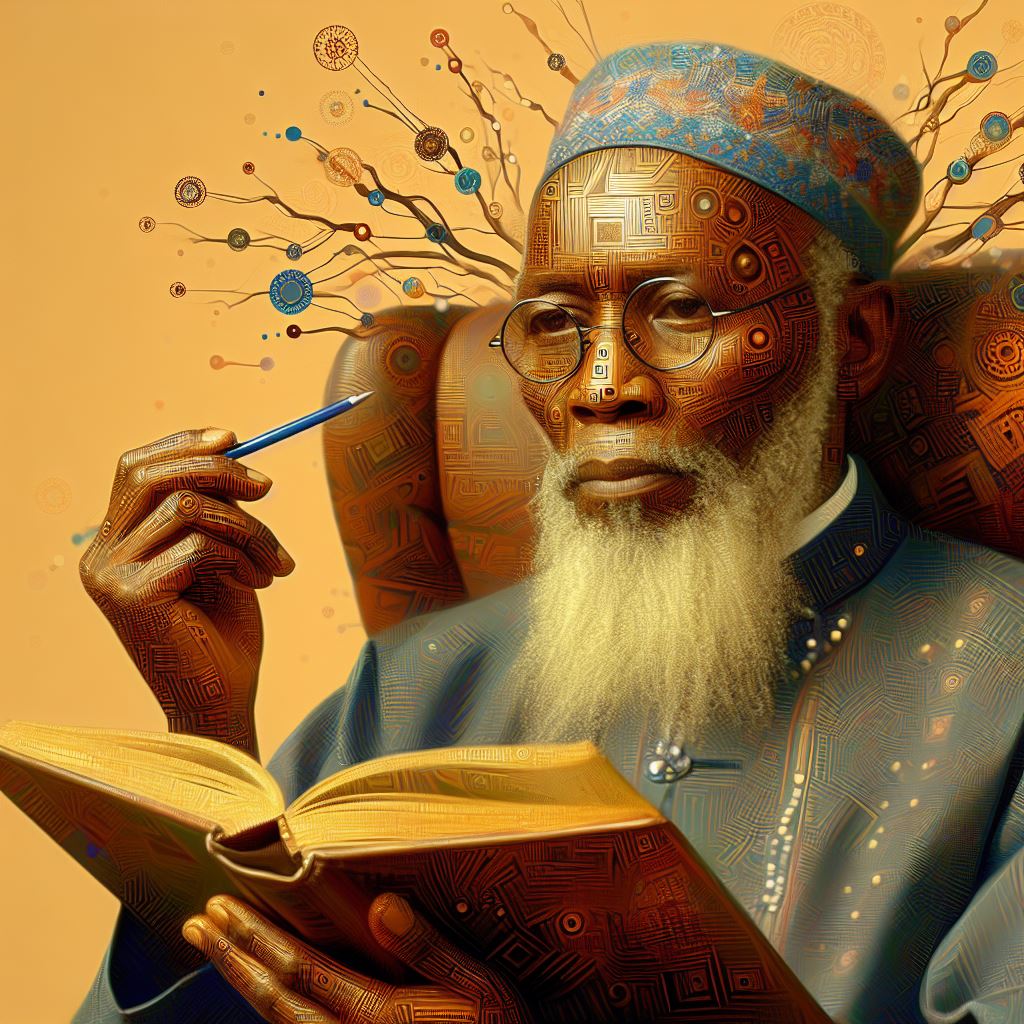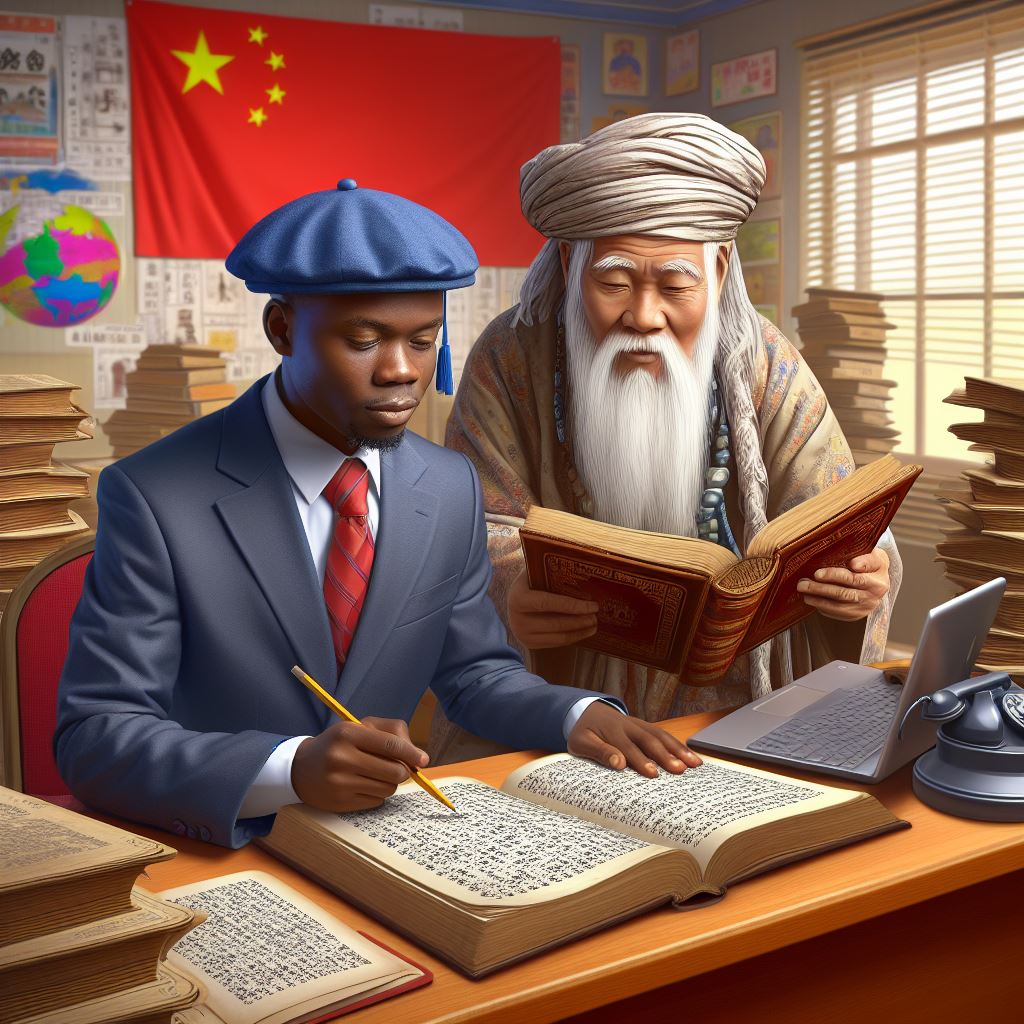Introduction
There is a growing interest in Chinese studies globally, driven by the rise of China as an economic and political superpower.
Understanding Chinese culture, language, and history is becoming increasingly important in today’s interconnected world.
Chinese Studies Curriculum in Nigeria
In Nigeria, the Chinese Studies Curriculum is designed to provide students with a comprehensive understanding of China’s rich cultural heritage and its rapid modernization.
The curriculum covers a wide range of subjects, including language, history, literature, and philosophy.
The Chinese language component of the curriculum aims to equip students with proficiency in Mandarin, the official language of China.
This will enable them to communicate effectively with Chinese speakers and open up opportunities for international collaboration and exchange.
Studying Chinese history is crucial for students to grasp the historical context of modern-day China and gain insights into its political and social dynamics.
By delving into China’s past, students can better understand the country’s present and anticipate its future trajectory.
Exploring Chinese literature and philosophy in the curriculum provides students with a deep dive into the cultural nuances that shape Chinese society.
They will learn about classical Chinese texts, famous literary works, and philosophical schools of thought that have influenced generations of Chinese thinkers.
Overall, the Chinese Studies Curriculum in Nigeria offers a holistic approach to understanding China in all its complexity.
By immersing themselves in Chinese language, history, literature, and philosophy, students can develop a nuanced perspective on one of the world’s most influential civilizations.
Overview of Chinese Studies Curriculum
What Chinese Studies Curriculum Entails
Embarking on a journey into Chinese Studies curriculum offers an immersive exploration of language, history, and culture.
This multifaceted curriculum not only broadens academic horizons but also fosters cultural understanding and global competency.
The Different Components of the Curriculum (Language, History, Culture, etc.)
At its core, Chinese Studies curriculum delves into the intricacies of Mandarin, offering students a gateway to one of the world’s most spoken languages.
Through rigorous language instruction, learners develop linguistic proficiency, enabling them to engage with Chinese texts, media, and conversations with confidence.
Beyond language acquisition, the curriculum unfurls the captivating tapestry of China’s rich history.
From ancient dynasties to modern revolutions, students traverse epochs, examining pivotal moments that shaped China’s narrative.
This historical lens not only elucidates China’s past but also illuminates its contemporary trajectory, providing invaluable context for global affairs.
Complementing linguistic and historical studies, the curriculum immerses students in the vibrant tapestry of Chinese culture.
From traditional arts like calligraphy and tea ceremonies to modern phenomena like pop culture and cuisine, students explore the multifaceted facets of Chinese identity.
This cultural immersion fosters cross-cultural appreciation and cultivates a nuanced understanding of China’s diverse society.
The Benefits of Studying Chinese Studies in Nigeria
Studying Chinese Studies in Nigeria offers a plethora of benefits, transcending academic boundaries.
Firstly, it opens doors to diverse career opportunities in diplomacy, trade, tourism, and academia.
As China continues to play a prominent role on the global stage, proficiency in Chinese language and culture is increasingly sought after in various industries.
Moreover, studying Chinese Studies fosters cultural exchange and diplomatic relations between Nigeria and China.
By nurturing a cadre of Chinese-speaking scholars and professionals, Nigeria can actively engage with China on bilateral and international platforms, fostering mutual understanding and collaboration.
Furthermore, Chinese Studies curriculum equips students with invaluable intercultural skills, essential in today’s interconnected world.
By navigating the complexities of language, history, and culture, students develop cultural empathy, adaptability, and communication prowess, essential attributes in a globalized society.
Most importantly, delving into Chinese Studies curriculum promises a transformative journey, rich in linguistic, historical, and cultural discoveries.
From unraveling the nuances of Mandarin to exploring China’s dynamic past and present, students embark on a voyage of intellectual enrichment and cross-cultural exchange.
Embracing the study of Chinese Studies in Nigeria not only expands academic horizons but also nurtures global citizens equipped to navigate the complexities of our interconnected world.
Read: Comparing Communication Arts and Mass Communication
Language Courses
Chinese studies curriculum typically offers a range of language courses to cater to different levels of proficiency. These courses are designed to help students develop their language skills and understanding of Chinese culture.
The language courses offered in Chinese studies curriculum
- Beginner Chinese Language Course: This course is ideal for students with little to no prior knowledge of the Chinese language. It covers basic vocabulary, grammar, and pronunciation.
- Intermediate Chinese Language Course: For students who have some foundation in Chinese, this course focuses on expanding vocabulary, improving communication skills, and understanding more complex grammatical structures.
- Advanced Chinese Language Course: Designed for students with a high level of proficiency in Chinese, this course delves into advanced vocabulary, cultural nuances, and fluency in both speaking and writing.
The levels of proficiency expected in Chinese language
The levels of proficiency expected in Chinese language courses vary depending on the institution and the specific curriculum.
However, by the end of their studies, students are generally expected to be able to converse fluently in Chinese, read and write with a high level of comprehension, and understand cultural nuances.
Learning the Chinese language is crucial in today’s globalized world for several reasons.
Firstly, China is a major player in the global economy, and understanding Chinese can open up numerous job opportunities in various industries.
The importance of learning the Chinese language in today’s globalized world
Secondly, being able to communicate in Chinese can enhance cultural understanding and foster better relationships with Chinese-speaking communities both domestically and internationally.
This is particularly important in fields such as diplomacy, business, and academia.
Furthermore, Chinese language proficiency is often seen as a valuable skill by employers, as it demonstrates a willingness to learn and adapt to different cultures and environments.
In an increasingly interconnected world, being able to speak Chinese can give individuals a competitive edge in the job market.
In general, language courses in Chinese studies curriculum play a vital role in helping students develop their language skills, cultural awareness, and global perspective.
By completing these courses, students can gain valuable skills that can benefit them both personally and professionally in today’s interconnected world.
Read: Language Arts Courses: What to Expect in Nigeria
Cultural Studies
- The cultural studies aspect of the Chinese studies curriculum delves into various aspects of Chinese culture.
- Understanding Chinese culture is significant in a global context to promote cultural awareness and appreciation.
- Cultural events and activities included in the curriculum aim to immerse students in authentic Chinese cultural experiences.
Exploring Chinese Culture
- Students will delve into the rich history, traditions, art, and literature of China.
- They will also explore the significance of Chinese festivals such as Chinese New Year.
- Visits to museums, cultural centers, and historical sites will be part of the curriculum.
Language and Communication
- Cultural studies will also focus on the importance of language and communication in Chinese culture.
- Understanding the nuances of communication in Chinese society is crucial for effective interaction.
- Students will have the opportunity to practice Chinese language skills through conversational activities and language immersion programs.
Food and Cuisine
- Chinese cuisine is an integral part of Chinese culture, reflecting regional diversity and traditions.
- Students will learn about popular Chinese dishes, tea culture, and dining etiquette.
- Cooking classes and food tasting sessions will give students a hands-on experience with Chinese culinary traditions.
Performing Arts and Festivals
- Chinese performing arts, such as traditional musical performances and dance forms, will be highlighted.
- Students will have the opportunity to watch live performances and even participate in cultural performances.
- Festivals like the Dragon Boat Festival and Mid-Autumn Festival will be celebrated through traditional activities and rituals.
Visual Arts and Crafts
- Chinese calligraphy, painting, and paper cutting are traditional art forms that students will explore.
- Hands-on workshops and art classes will allow students to create their own Chinese art pieces.
- The significance of symbolism and cultural motifs in Chinese art will be discussed in depth.
Global Perspective
- Understanding Chinese culture in a global context is essential for fostering cross-cultural communication.
- By studying Chinese cultural practices, students can appreciate diversity and intercultural differences.
- The curriculum aims to promote cultural exchange and dialogue to build understanding and mutual respect among different cultures.
Read: Internship Opportunities for Communication Arts Students

History and Politics
The Historical and Political Aspects Covered in Chinese Studies Curriculum
Exploring the historical and political facets in Chinese studies curriculum reveals a fascinating journey of discovery.
The curriculum meticulously examines China’s rich historical tapestry, spanning millennia of dynasties, revolutions, and cultural transformations.
The Importance of Understanding China’s History and Political System
Understanding China’s history is paramount as it provides essential context for comprehending contemporary Chinese society and its global influence.
Moreover, delving into China’s political system elucidates its governance structure, ideological foundations, and policy-making mechanisms.
The Significance of Studying China’s Role in Global Politics
Grasping China’s political landscape equips students with insights into the dynamics shaping domestic affairs and international relations.
Studying China’s political evolution fosters critical thinking and analytical skills, enabling students to navigate complex geopolitical landscapes with acumen.
Furthermore, the curriculum underscores the significance of studying China’s role in global politics, given its status as a major global player.
China’s economic prowess, diplomatic strategies, and geopolitical ambitions exert profound influence on international affairs, shaping the course of global politics.
Analyzing China’s foreign policy initiatives, bilateral relations, and involvement in multilateral organizations provides invaluable insights into contemporary global dynamics.
Moreover, understanding China’s perspective on key global issues fosters dialogue, cooperation, and conflict resolution in the international arena.
Therefore, the historical and political dimensions of Chinese studies curriculum offer a comprehensive understanding of China’s past, present, and future trajectory.
By unraveling China’s historical legacy and political landscape, students gain profound insights into its societal, economic, and geopolitical dimensions.
Equipped with this knowledge, students emerge as informed global citizens capable of engaging meaningfully with China’s multifaceted role in shaping the world order.
Read: Impact of Communication Arts on Nigerian Media
You Might Also Like: Nigerian Languages: Historical Evolution and Changes
You Might Also Like: Skills Needed for a Career in Criminology in Nigeria
Study Abroad Opportunities
The Opportunities for Students to Study Abroad in China
Discovering study abroad opportunities in Chinese Studies curriculum promises an enriching and transformative experience for students.
Opportunities abound for students to immerse themselves in the vibrant tapestry of Chinese culture and language.
The Benefits of Immersing Oneself in Chinese Culture and Language
Studying abroad in China offers unparalleled opportunities to deepen linguistic proficiency and cultural understanding firsthand.
Through immersive language programs, students engage in authentic language practice, honing their Mandarin skills in real-world settings.
Moreover, living in China provides students with a unique cultural immersion experience, fostering cross-cultural communication and empathy.
The Exchange Programs and Scholarships Available for Students
Beyond language and culture, studying abroad in China facilitates academic exploration and personal growth in a dynamic international environment.
Students have access to a myriad of exchange programs and scholarships tailored to support their study abroad endeavors.
These programs offer financial assistance, academic support, and cultural enrichment activities to enhance the study abroad experience.
Furthermore, exchange programs facilitate meaningful interactions with Chinese students, fostering cross-cultural friendships and understanding.
Participating in study abroad programs in China not only enriches academic pursuits but also cultivates global citizenship and intercultural competence.
Students return home with invaluable experiences, perspectives, and connections that enrich their personal and professional lives.
All in all, study abroad opportunities in Chinese Studies curriculum open doors to a world of exploration, learning, and personal growth.
Immersing oneself in Chinese culture and language broadens horizons, fosters empathy, and cultivates global citizenship.
Transform Your Career with Expert Guidance
Get personalized mentorship consulting that’s tailored to your unique path. Our expert advice is actionable and exclusive.
Get StartedWith a plethora of exchange programs and scholarships available, students are empowered to embark on transformative study abroad experiences in China.
Explore Further: Film Production Internships and Opportunities in Nigeria
Career Opportunities
The Career Prospects for Graduates with a Background in Chinese Studies
Exploring career prospects for graduates in Chinese studies unveils a multitude of exciting opportunities.
Proficiency in Chinese language and culture opens doors to diverse industries and sectors globally.
The Industries and Sectors Where Knowledge of Chinese Language and Culture Is Valued
Industries such as international business, trade, tourism, and diplomacy highly value Chinese language skills.
In today’s interconnected world, companies seek professionals who can navigate Chinese markets and foster international partnerships.
The Potential for Working in Diplomacy, International Relations, or Business
Moreover, the demand for Chinese-speaking professionals extends beyond business sectors to fields like journalism, education, and research.
Graduates with a background in Chinese studies are well-positioned for roles in diplomacy and international relations.
As China plays a pivotal role in global affairs, diplomats with expertise in Chinese language and culture facilitate effective communication and collaboration.
Furthermore, opportunities abound in multinational corporations seeking to expand their presence in the Chinese market.
Professionals adept in Chinese language and cultural nuances serve as liaisons, bridging cultural gaps and facilitating successful business ventures.
Entrepreneurial ventures in China’s dynamic market offer another avenue for graduates with a background in Chinese studies.
Navigating China’s regulatory landscape and cultural intricacies, entrepreneurs capitalize on opportunities for innovation and growth.
In addition to traditional career paths, graduates can pursue opportunities in academia and research, contributing to scholarship and cross-cultural understanding.
Overall, a background in Chinese studies equips graduates with versatile skills and global perspectives essential for success in today’s competitive job market.
Overall, the career landscape for graduates in Chinese studies is vibrant and promising.
Proficiency in Chinese language and culture opens doors to diverse industries, from business to diplomacy.
Whether pursuing roles in international business, diplomacy, or academia, graduates with a background in Chinese studies are poised for success in a globalized world.
See Related Content: Role of Arts in Nigerian Education System
Conclusion
In closing, Chinese studies curriculum offers a comprehensive understanding of Chinese history, language, and culture.
Students can expect to delve into traditional Chinese values, modern Chinese society, and global perspectives regarding China’s role in the world.
This field of study provides a platform for critical thinking, cross-cultural communication, and appreciation of diversity, which are essential skills in today’s interconnected world.
We encourage readers to consider Chinese studies as a valuable field of study that not only offers academic knowledge but also fosters a deeper understanding of one of the world’s oldest civilizations.
By exploring Chinese studies, students can broaden their horizons, gain cross-cultural competence, and develop a global mindset that is crucial in today’s multicultural society.
Embracing cultural diversity through Chinese studies is vital in promoting intercultural understanding, tolerance, and cooperation.
By learning about Chinese history, language, and culture, individuals can enhance their ability to engage with people from diverse backgrounds, contribute to a more inclusive society, and build bridges across different cultures.




